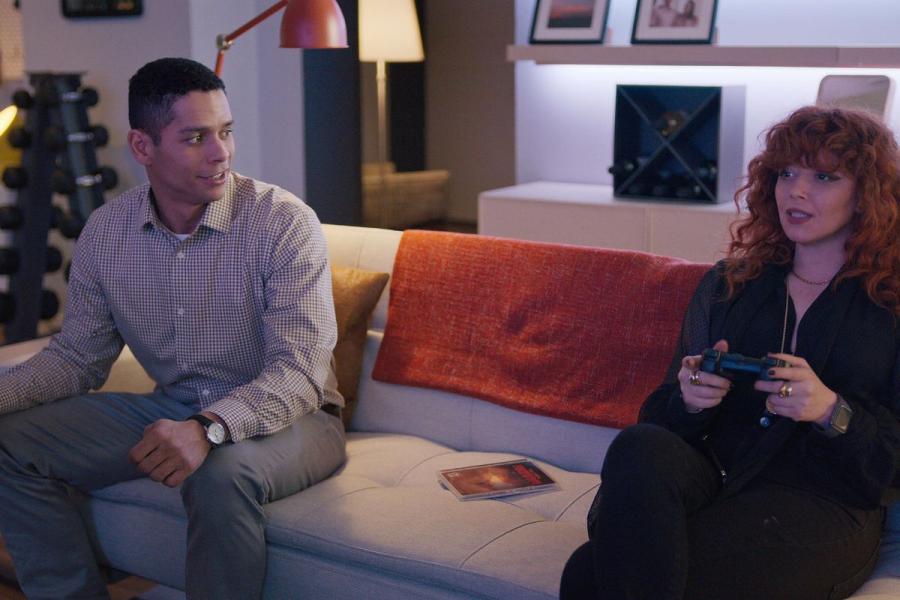
Russian Doll: Television in Digital Culture
The rise in qualitative and creative television shows in recent years has brought us many interesting narratives; Russian Doll is certainly one of them. With Russian Doll, Netflix brings us a new innovative TV show that plays with video game storytelling, social media humor, and the bending of gendered stereotypes.
Russian Doll as a video game narrative
“What if life treated you the way that a video game treats you, which is that you can’t move forward until you accomplish this thing, and you’re just not allowed to until you accomplish this thing?”
This is the dilemma that is faced by Nadia Vulvokov (Natasha Lyonne) in the Netflix series Russian Doll. After she gets hit by a car while leaving her 36th birthday party, Nadia finds herself back at that same party, earlier in the night. At first, Nadia thinks it must have been an effect of the drugs she used, but she soon finds out that she is, strangely, not allowed to die. Every time she leaves the party, Nadia meets her end and gets transported back to the same time and place. She is stuck in a surreal time loop that forces her to confront the traumas that shaped her into the anxious, eccentric New Yorker she is.
After Russian Doll premiered on February 1, the series has received almost unanimously positive reviews. With a score of 98% on Rotten Tomatoes, the series is hauled as innovative and genre bending. Alan Sepinwall wrote for Rolling Stone: “That blend of tones, and the controlled mania of Lyonne’s brilliant performance, makes Russian Doll feel like something wholly new, even as it cops to its many influences.” (Rolling Stone)
Russian Doll uses the surreal sensation of looking back on your life and realizing the futility of your choices, to create a funny, but also very dark comedy.
Like many reviewers, Sepinwall argues that Russian Doll is reminiscent of the 1993 movie Groundhog Day by director Harold Ramis. In that classic comedy, protagonist Phil Connors (Bill Murray) is forced to relive one day again and again. However, according to Leslye Headland, one of Russian Doll’s directors and writers, this analogy is not completely accurate: “It’s more about a woman that’s unable to move to the next level. It’s much more of a video game analogy than it is like a Groundhog Day or Happy Death Day.” (Polygon)
And to be honest, the references to video games in Russian Doll are very obvious. Not least because Nadia is a programmer at a video game company (called ‘Rock and Roll Games’ – which Headland confirms is an explicit nod to 'Rockstar Games'). This seems like an obvious invitation to look at the distinctive narrative structure of Russian Doll and consider it as the story of a video game character struggling to complete a certain task and being brought back to the start of a level every time she fails her challenge.

Nadia and Alan play video games
#killme humor
As gimmicky as this might sound, the use of videogame storytelling is more than that. It is used as a narrative device that comments on the struggles of contemporary life. Headland explains: “With Amy [Poehler], I remember talking so much about how we have infinite choices and yet our coding or our makeup or our psychology dictates our choices at the same time. I remember Natasha [Lyonne] talking about the All That Jazz aspect of re-looking at your life and your choices, like from a hospital bed, seeing your life choices flash before your eyes in a very kind of magical realism way as opposed to a pure trauma, much more like you’re laughing because it’s so crazy.” (Polygon) The show uses this surreal sensation of looking back on your life and realizing the futility of your choices, to create a funny, but also very dark comedy.
In his review for io9.com, Charles Pulliam-Moore points out that the existential situation the series refers to resonates with the discourse that is used in social media to talk about contemporary life struggles. Pulliam-Moore writes: “Performatively longing for death’s embrace has become shorthand for expressing one’s desire to be free from the day-to-day frustrations and slights that come part and parcel with being an adult. It’s something people openly joke about, assuming you would never take the text of their bit too seriously because you’re just expressing the same kind of disillusionment they feel.” (io9.com) By combining anxiety and humor, the darkness of daily struggles become the subject of funny exchanges on social media. It is the recognizability of this anxious state, as experienced by a whole generation, that keeps these jokes from being devastating, and turns them instead into a moment of relief.

Examples of #killme humor
Much like these memes, Russian Doll combines the dread of contemporary life with a sense of dark humor. “Russian Doll embraces the idea that there’s a profound sort of introspective honesty and vulnerability baked into that dark humor, and makes it a vital part of the story the show is telling.” (io9.com) Nadia’s sharp, witty, overtly articulate humor is shown against a background story of a traumatic past dominated by an unstable famliy life and susbtance abuse. The series itself combines a humorous, fast-paced narrative with the story of a woman who repeatedly dies in a number of horrifying ways, frequently in front of her loved ones.
Gendered digital narratives
Russian Dolls is created, written, and produced by Natasha Lyonne, Amy Poehler, and Leslye Headland. It seems significant that this videogame narrative with its #killme humor is used in a show that not only revolves around a female protagonist, but is also made by a group of women. The show is clearly aware of the masculine connotations of video games, both on the side of production as within the player community.
As a female programmer for a game company, several scenes show Nadia engaged in conversations in which men comment on her professional abilities. Whether it is the group of all-male colleagues who try to blame Nadia for a mistake in the code they had made themselves. Or Nadia's friend Alan, who has gotten stuck in a particularly difficult level of a game Nadia worked on, and comments that if she even actually worked on this game, she ‘obviously never played the game’. Nadia is repeatedly shown to fight for her place in this world, which she seems to enjoy outside the presence of man's judgemental eyes. As such, Russian Doll seems to deliberately claim its place as a female video game story within a male-dominated genre.
Russian Doll is another product of the high level of creativity in contemporary television. A series in which the creators find new ways to tell stories, integrate digital humor and experiences into traditional narratives, and challenge existing stereotypes such as gender roles.